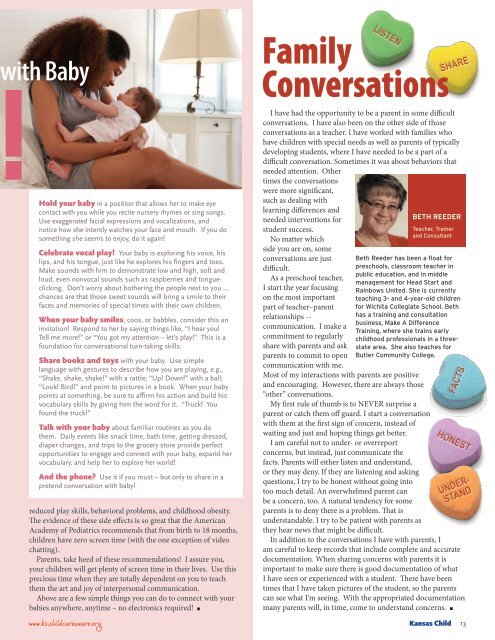2018 Spring Kansas Child
All about relationships
All about relationships
- No tags were found...
You also want an ePaper? Increase the reach of your titles
YUMPU automatically turns print PDFs into web optimized ePapers that Google loves.
with Baby<br />
LISTEN<br />
Family<br />
Conversations<br />
SHARE<br />
Hold your baby in a position that allows her to make eye<br />
contact with you while you recite nursery rhymes or sing songs.<br />
Use exaggerated facial expressions and vocalizations, and<br />
notice how she intently watches your face and mouth. If you do<br />
something she seems to enjoy, do it again!<br />
Celebrate vocal play! Your baby is exploring his voice, his<br />
lips, and his tongue, just like he explores his fingers and toes.<br />
Make sounds with him to demonstrate low and high, soft and<br />
loud, even nonvocal sounds such as raspberries and tongueclicking.<br />
Don’t worry about bothering the people next to you …<br />
chances are that those sweet sounds will bring a smile to their<br />
faces and memories of special times with their own children.<br />
When your baby smiles, coos, or babbles, consider this an<br />
invitation! Respond to her by saying things like, “I hear you!<br />
Tell me more!” or “You got my attention – let’s play!” This is a<br />
foundation for conversational turn-taking skills.<br />
Share books and toys with your baby. Use simple<br />
language with gestures to describe how you are playing, e.g.,<br />
“Shake, shake, shake!” with a rattle; “Up! Down!” with a ball;<br />
“Look! Bird!” and point to pictures in a book. When your baby<br />
points at something, be sure to affirm his action and build his<br />
vocabulary skills by giving him the word for it. “Truck! You<br />
found the truck!”<br />
Talk with your baby about familiar routines as you do<br />
them. Daily events like snack time, bath time, getting dressed,<br />
diaper changes, and trips to the grocery store provide perfect<br />
opportunities to engage and connect with your baby, expand her<br />
vocabulary, and help her to explore her world!<br />
And the phone? Use it if you must – but only to share in a<br />
pretend conversation with baby!<br />
reduced play skills, behavioral problems, and childhood obesity.<br />
The evidence of these side effects is so great that the American<br />
Academy of Pediatrics recommends that from birth to 18 months,<br />
children have zero screen time (with the one exception of video<br />
chatting).<br />
Parents, take heed of these recommendations! I assure you,<br />
your children will get plenty of screen time in their lives. Use this<br />
precious time when they are totally dependent on you to teach<br />
them the art and joy of interpersonal communication.<br />
Above are a few simple things you can do to connect with your<br />
babies anywhere, anytime – no electronics required! n<br />
I have had the opportunity to be a parent in some difficult<br />
conversations. I have also been on the other side of those<br />
conversations as a teacher. I have worked with families who<br />
have children with special needs as well as parents of typically<br />
developing students, where I have needed to be a part of a<br />
difficult conversation. Sometimes it was about behaviors that<br />
needed attention. Other<br />
times the conversations<br />
were more significant,<br />
such as dealing with<br />
learning differences and<br />
needed interventions for<br />
student success.<br />
No matter which<br />
side you are on, some<br />
conversations are just<br />
difficult.<br />
As a preschool teacher,<br />
I start the year focusing<br />
on the most important<br />
part of teacher–parent<br />
relationships --<br />
communication. I make a<br />
commitment to regularly<br />
share with parents and ask<br />
parents to commit to open<br />
communication with me.<br />
Most of my interactions with parents are positive<br />
and encouraging. However, there are always those<br />
“other” conversations.<br />
My first rule of thumb is to NEVER surprise a<br />
parent or catch them off guard. I start a conversation<br />
with them at the first sign of concern, instead of<br />
waiting and just and hoping things get better.<br />
I am careful not to under- or overreport<br />
concerns, but instead, just communicate the<br />
facts. Parents will either listen and understand,<br />
or they may deny. If they are listening and asking<br />
questions, I try to be honest without going into<br />
too much detail. An overwhelmed parent can<br />
be a concern, too. A natural tendency for some<br />
parents is to deny there is a problem. That is<br />
understandable. I try to be patient with parents as<br />
they hear news that might be difficult.<br />
BETH REEDER<br />
Teacher, Trainer<br />
and Consultant<br />
Beth Reeder has been a float for<br />
preschools, classroom teacher in<br />
public education, and in middle<br />
management for Head Start and<br />
Rainbows United. She is currently<br />
teaching 3- and 4-year-old children<br />
for Wichita Collegiate School. Beth<br />
has a training and consultation<br />
business, Make A Difference<br />
Training, where she trains early<br />
childhood professionals in a threestate<br />
area. She also teaches for<br />
Butler Community College.<br />
FACTS<br />
HONEST<br />
UNDER-<br />
STAND<br />
In addition to the conversations I have with parents, I<br />
am careful to keep records that include complete and accurate<br />
documentation. When sharing concerns with parents it is<br />
important to make sure there is good documentation of what<br />
I have seen or experienced with a student. There have been<br />
times that I have taken pictures of the student, so the parents<br />
can see what I’m seeing. With the appropriated documentation<br />
many parents will, in time, come to understand concerns. n<br />
www.ks.childcareaware.org <strong>Kansas</strong> <strong>Child</strong> 13
















